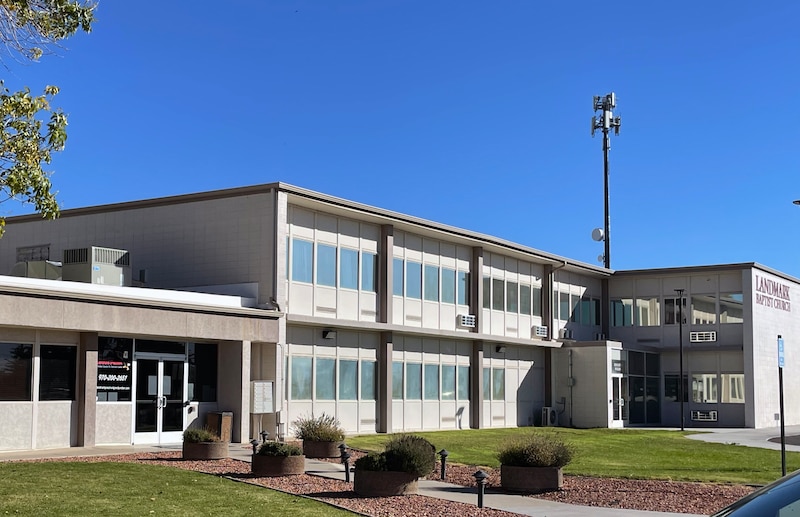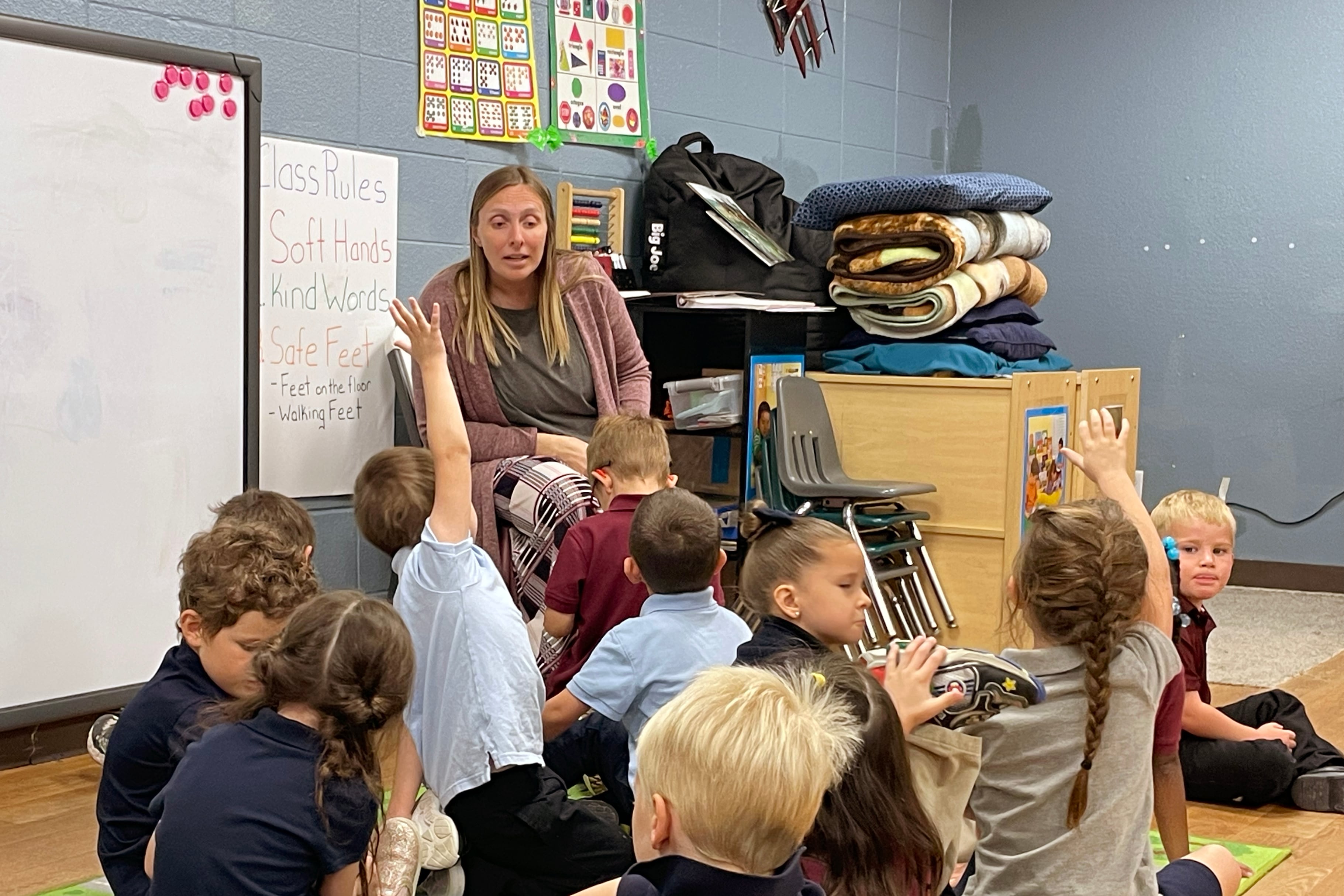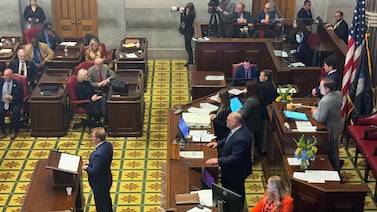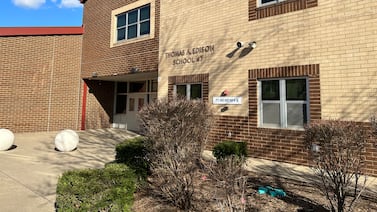When teacher Corrie Haynes asked the preschoolers gathered on the green rug in front of her what sin is, a little boy answered confidently: “All the bad things we do.”
“Very good,” she said.
Next, the 13 children, most wearing maroon or blue polo shirts and dark skirts or pants, learned that everybody sins — even teachers, moms and dads, and the church pastor — and that although God hates sin, he doesn’t hate people who sin.
“He still loves us very much even when we sin,” Haynes said.
A minute later, Haynes led the 4-year-olds in a song about manners: “Always say thank you, always say please. When we’re ungrateful, God is not pleased.”
Such religious content has long been woven through the lessons at Landmark Preschool, which is nestled inside Landmark Baptist Church in the western Colorado city of Grand Junction. What’s different this year is that state taxpayers are covering the bill — more than $100,000 — for 20 preschoolers to attend classes there.
Colorado explicitly invited faith-based preschools to participate in its new $322 million universal preschool program, which despite a rocky rollout has proven popular with families. But state officials have sent mixed messages about whether preschools can offer religious instruction during state-funded class time. Prior to the launch, they said it was forbidden. Now, they say it’s not, but that next year it could be.
Debates about public funding for religious education come amid an ongoing conservative push to break down long-held ideas about the separation of church and state, including in a lawsuit underway now over a religious charter school in Oklahoma. Colorado’s Constitution, like those in many other states, prohibits using public money for religious purposes. But a series of recent U.S. Supreme Court decisions has hollowed out such provisions.
In order to participate in Colorado’s universal preschool program, preschools, including Landmark, had to sign a contract agreeing to a variety of conditions, including that they would not discriminate based on sexual orientation and gender identity. That requirement is now the subject of two lawsuits — one by a Christian preschool in Chaffee County and the other by two Catholic parishes that run preschools near Denver. The contract that providers signed did not mention religious instruction.
Lauren Weber, the director of Landmark Preschool, said such instruction is “built into pretty much everything we do.”
But some experts say mixing public dollars and religious education clashes with the nation’s historical underpinnings.
“If our taxpayer money is funding religious exercise … then we are putting ourselves in a position of the state and the church getting entangled in a way that the founders were trying to avoid,” said Kevin Welner, director of the National Education Policy Center at the University of Colorado Boulder.
State plans to restrict religious lessons in universal preschool
Colorado early childhood officials have proposed a ban on religious instruction in a set of rules they plan to approve next spring. It’s not clear where that would leave programs like Landmark, where leaders hope to open two additional universal preschool classrooms next year.
Such questions are playing out amid a rapidly changing legal landscape. The latest shift came in June 2022 when the U.S. Supreme Court issued a decision in a Maine voucher case called Carson v. Makin. The court ruled that Maine could not exclude schools that offer religious instruction from a state-funded program open to secular private schools. The ruling built on a series of decisions in which the high court has grown more sympathetic to the idea of using public money for religious purposes, including religious education.
Steven Green, a law professor at Willamette University who specializes in church and state issues, said the shift has come as the share of Christians in the United States shrinks and the share of people without a religious affiliation grows.
Amid these demographic changes, “We’re seeing a kind of circling of the wagons and a feeling of being dispossessed of privilege, particularly white, conservative Christians,” he said.
That narrative has created growing support for measures that allow or inject religion into public life, he said.
Green said that five or six years ago, Colorado could have banned religious instruction during state-funded preschool classes fairly easily. But the U.S. Supreme Court has mostly invalidated state constitutional provisions that prohibit public funds for religious purposes. Now, such provisions — often referred to as Blaine amendments — are “pretty much unenforceable,” he said.
Michael Bindas, a senior attorney with the Institute for Justice, a libertarian public interest law firm, agreed. He also said the ruling in the Carson case, which he argued on behalf of the plaintiffs before the Supreme Court, makes clear that asking faith-based schools to eliminate religious instruction during state-funded class time amounts to religious discrimination.
If Colorado adopts the proposed rules banning religious instruction during state-funded preschool hours, he said, “I suspect it will be tied up in years of litigation.”
Welner worries that some preschools’ religious teachings could send damaging messages to children. He raised the possibility of a young transgender child attending universal preschool in a faith-based program that’s intolerant of transgender people.
“There is something disturbing, to me at least, about using taxpayer money to subsidize the education of a child in an environment that is essentially attacking the kid’s identity,” he said.
Parent choice was part of the universal preschool vision
Colorado’s Democratic governor, Jared Polis, has championed state-funded preschool for all since hitting the gubernatorial campaign trail in 2017. Two years later, during his first term, voters approved a nicotine tax to help pay for the program.
Parents began applying last winter, using an online form to choose up to five preschools they liked. The state matching system then assigned their child to a spot at one of them. Despite some confusion about the application process, families flocked to join, and enrollment quickly exceeded the state’s projections. Today, nearly 50,000 children are getting tuition-free preschool through the program, most of them 4-year-olds.
From the beginning, state leaders planned to offer universal preschool in all kinds of settings — in public schools, faith-based centers, and homes licensed by the state. The idea was to give parents lots of choices, more than were offered under the state’s previous smaller preschool program for children with risk factors. That was mostly offered in public school classrooms.
Of the more than 1,900 preschools that joined the universal program, 39 are faith-based, according to state data. Together, they serve about 930 children.
Allowing faith-based preschools to participate in publicly funded early childhood programs is nothing new. The federal Head Start preschool program, plus a number of states and cities, have done it for years. But unlike Colorado’s universal program, those programs — including Denver’s long-running taxpayer-funded preschool tuition assistance program — generally prohibit religious instruction during the government-funded portion of the day.
Such a restriction was on Colorado’s radar, too. An open records request found that in October 2022, the state’s universal preschool director sent a fact sheet to more than 50 local universal preschool officials stating that faith-based preschools could participate, as long as they didn’t use state funds for religious programming. Some of those local officials posted that condition on their websites.
But somehow, amid the chaos leading up to the launch, the issue got lost. Last spring, the state ran out of time to create rules on things like class size, curriculum, and teacher training, so it told participating preschools to “keep doing what you’re doing.” State leaders pledged to come up with rules by the start of the second year in August 2024 and are in that process now.
In October, state officials told Chalkbeat by email that there’s nothing in writing prohibiting religious instruction in universal preschool. A spokesperson for the Colorado Department of Early Childhood declined to comment about why the department didn’t establish rules on the issue from the outset.
Will this Christian curriculum be used in preschools next year?
Landmark Preschool opened in 2012 and serves children from infancy through preschool, about half of them from low-income families. It has the second highest rating on the state’s five-level scale for child care quality.

The school has two universal preschool classrooms, one that is play-based and one that is more structured, teaching skills like cursive writing. Both use the Abeka curriculum, a program popular with Christian schools and homeschooling families that describes the Bible as the foundation for all learning.
Currently, there are no state rules governing curriculum in universal preschool, but state officials plan to create a list of acceptable curriculums before the second year of the program starts. It’s not clear what the criteria will be or whether programs like Abeka will pass muster.
Weber, the center’s director, and Christy Barrows, an administrator at Landmark’s adjoining K-12 school, say they received repeated reassurances from local universal preschool officials that their program and curriculum would be acceptable.
“We’re very open about who we are and what we teach,” said Weber. “I tell all my tours, ‘Find the right fit for you, and if it’s not (here), that’s OK.’”
The preschool welcomes all children, including those from LGBTQ families, she said. But hiring decisions are not as simple.
“We have the Christian values and morals and beliefs,” Weber said. “That hire may not be a good fit for our center, because we will be teaching these values, and if you don’t believe in these values, that’s really hard to be hired.”
Bible lessons shape storytime at Landmark Preschool
Inside Haynes’ preschool classroom, it was time for a Bible story on obedience — specifically obedience to God. Between pauses to settle antsy children, Haynes told about a young girl who was stolen from her family and forced to work for the powerful general Naaman, who had leprosy.
“There were huge sores all over Naaman’s skin, and all these sores would keep getting worse and worse,” Haynes explained. But the girl stepped in to help, suggesting Naaman should visit a prophet.
“The little girl could have said, ‘It serves Naaman right to have leprosy. I’ve been taken away from my home and made to work as a servant,’” Haynes said.
Instead, “the girl chose to do what was right and forgive even though no one had told her to do it.”
Weber, who sat nearby observing the class, is waiting to see what new rules universal preschool leaders put in place and whether Abeka will make the approved curriculum list.
“Right now, it’s working out just fine, but in the future what does it look like?” she said. “We’re just going to take it year by year and see what we do.”
Ann Schimke is a senior reporter at Chalkbeat, covering early childhood issues and early literacy. Contact Ann at aschimke@chalkbeat.org.








